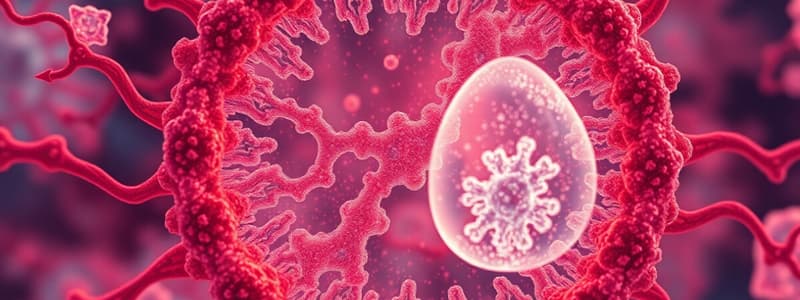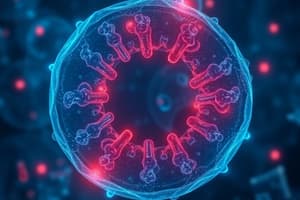Podcast
Questions and Answers
What is the role of telomeres at the ends of chromosomes?
What is the role of telomeres at the ends of chromosomes?
- They assist in the replication of DNA.
- They stabilize the chromosome structure. (correct)
- They provide sites for sister chromatid attachment.
- They facilitate spindle attachment during division.
What primarily regulates the movement of chromosomes during mitosis?
What primarily regulates the movement of chromosomes during mitosis?
- Cytokinesis readiness
- Nuclear envelope integrity
- Cell shape changes
- Kinetochores (correct)
Which feature distinguishes diploid cells from haploid cells?
Which feature distinguishes diploid cells from haploid cells?
- Diploid cells contain homologous pairs of chromosomes. (correct)
- Haploid cells are found only in somatic tissues.
- Diploid cells undergo binary fission.
- Haploid cells have two complete sets of chromosomes.
Which process primarily occurs during interphase of the eukaryotic cell cycle?
Which process primarily occurs during interphase of the eukaryotic cell cycle?
What distinguishes the cell cycle of prokaryotes from that of eukaryotes?
What distinguishes the cell cycle of prokaryotes from that of eukaryotes?
Which cells typically divide the most frequently?
Which cells typically divide the most frequently?
What is the primary outcome of the eukaryotic cell cycle?
What is the primary outcome of the eukaryotic cell cycle?
What function does the centromere serve during cell division?
What function does the centromere serve during cell division?
Which cell cycle phase is characterized by the growth and increase in cell size as well as metabolic activities?
Which cell cycle phase is characterized by the growth and increase in cell size as well as metabolic activities?
During which phase of mitosis do chromosomes align at the metaphase plate?
During which phase of mitosis do chromosomes align at the metaphase plate?
What occurs during the anaphase stage of mitosis?
What occurs during the anaphase stage of mitosis?
What component is absent in plant cells that is present in animal cells, aiding in spindle organization during mitosis?
What component is absent in plant cells that is present in animal cells, aiding in spindle organization during mitosis?
Which cellular event occurs during the G2 phase before mitosis begins?
Which cellular event occurs during the G2 phase before mitosis begins?
What type of cell division produces two daughter cells with identical chromosomes to the parent cell?
What type of cell division produces two daughter cells with identical chromosomes to the parent cell?
In plant cells, how is cytokinesis achieved given the rigidity of the cell wall?
In plant cells, how is cytokinesis achieved given the rigidity of the cell wall?
What is the primary function of the cell cycle's synthesis phase (S)?
What is the primary function of the cell cycle's synthesis phase (S)?
What is the primary outcome of meiosis in terms of chromosome number in daughter cells?
What is the primary outcome of meiosis in terms of chromosome number in daughter cells?
During which stage of prophase I does crossing over occur?
During which stage of prophase I does crossing over occur?
Which term describes the pair of homologous chromosomes formed during synapsis?
Which term describes the pair of homologous chromosomes formed during synapsis?
What structural change occurs to the nucleolus during prophase I of meiosis?
What structural change occurs to the nucleolus during prophase I of meiosis?
What is the significance of chiasma during meiosis?
What is the significance of chiasma during meiosis?
Which of the following correctly describes the chromosome behavior during Metaphase I?
Which of the following correctly describes the chromosome behavior during Metaphase I?
How many times does the cell divide during meiosis?
How many times does the cell divide during meiosis?
What is the genetic outcome of crossing over in Meiosis?
What is the genetic outcome of crossing over in Meiosis?
What is the key difference between anaphase I of meiosis and anaphase of mitosis?
What is the key difference between anaphase I of meiosis and anaphase of mitosis?
During which stage do chromosome numbers reduce, and the nuclear envelope reforms in meiosis?
During which stage do chromosome numbers reduce, and the nuclear envelope reforms in meiosis?
What aspect of crossing over is true?
What aspect of crossing over is true?
What happens in telophase II and cytokinesis II?
What happens in telophase II and cytokinesis II?
Which statement correctly describes the organization of chromosomes during metaphase?
Which statement correctly describes the organization of chromosomes during metaphase?
Flashcards are hidden until you start studying
Study Notes
Chromosome Structure
- The centromere is the attachment site of sister chromatids.
- Telomeres are repeated nucleotide sequences at the ends of chromosomes, essential for stability.
- Kinetochores mediate spindle microtubule attachment and control chromosomal movement during mitosis and meiosis.
Cell Cycle
- The cell cycle refers to the series of events in a cell resulting in growth, DNA replication, and division.
- Somatic cells are diploid (2n) with two complete sets of chromosomes.
- Gametes are haploid (n) with one set of unpaired chromosomes.
Prokaryotic Cell Cycle
- Prokaryotes reproduce asexually through binary fission.
- DNA replication occurs continuously, not in phases.
- The process involves cell elongation, plasma membrane growth inward, and septum formation.
Eukaryotic Cell Cycle
- Eukaryotic cells divide through mitosis and meiosis, depending on factors like cell type and signals.
- Bone marrow and skin cells divide frequently, while nerve and muscle cells stop dividing after maturation.
Interphase
- The longest stage of the cell cycle, accounting for over 90% of the time.
- Includes the first gap phase (G1), synthesis phase (S), and the second gap phase (G2).
- During G1, cells grow, increase in size, and produce ribosomes and RNA.
- The S phase involves DNA synthesis and replication.
- G2 is characterized by intensive cellular synthesis, protein production, and continued cell growth.
Mitosis
- Division of the nucleus and cytoplasm, resulting in two daughter cells with identical chromosomes to the parent cell.
- Essential for repair and replacement of dead cells.
- In animal cells, centrosomes containing centrioles and asters organize spindle microtubules.
- In plant cells, spindle fibers are organized by enzymes, and a cell plate forms from vesicles for cell wall formation.
Stages of Mitosis
- Prophase: Chromosomes condense, nucleoli disappear, nuclear envelope breaks down, and spindle fibers form.
- Metaphase: Chromosomes align at the metaphase plate, perpendicular to spindle fibers.
- Anaphase: Sister chromatids separate as daughter chromosomes move to opposite poles of the cell.
- Telophase: Chromatin uncoils, nuclear envelopes form, and cleavage furrow forms in animal cells, while a cell plate forms in plant cells.
- Cytokinesis: Division of cytoplasm and organelles, resulting in two daughter cells.
Meiosis
- Division of the nucleus resulting in four daughter cells, each haploid (n) and genetically different from the parent cell.
- Important for producing sex cells and maintaining species.
Stages of Meiosis I
- Prophase I: Chromosomes condense, homologous chromosomes pair up (synapsis) forming bivalents, crossing over occurs (exchange of genetic material), and the nuclear envelope disintegrates.
- Metaphase I: Bivalents align across the metaphase plate, with each pointing to one pole.
- Anaphase I: Homologous chromosomes separate, moving to opposite poles.
- Telophase I & Cytokinesis: Chromosomes are partitioned into two nuclei, and cytoplasm divides.
Stages of Meiosis II
- Prophase II: New spindle fibers form.
- Metaphase II: Chromosomes align at the metaphase plate.
- Anaphase II: Centromeres split, and chromatids move to opposite poles.
- Telophase II & Cytokinesis II: Nuclei reform, chromatin uncoils, and cytoplasm divides, resulting in four haploid daughter cells.
Key Differences Between Mitosis and Meiosis
- Mitosis produces two diploid daughter cells, while meiosis produces four haploid daughter cells.
- DNA replicates only once during interphase before mitosis and meiosis I, but not before meiosis II.
- Crossing over occurs only in prophase I of meiosis, not in mitosis or meiosis II.
- Homologous chromosomes align at the metaphase plate in meiosis I, while individual chromosomes align in mitosis.
- Centromeres remain intact in anaphase I of meiosis, while sister chromatids separate in mitosis.
Studying That Suits You
Use AI to generate personalized quizzes and flashcards to suit your learning preferences.




